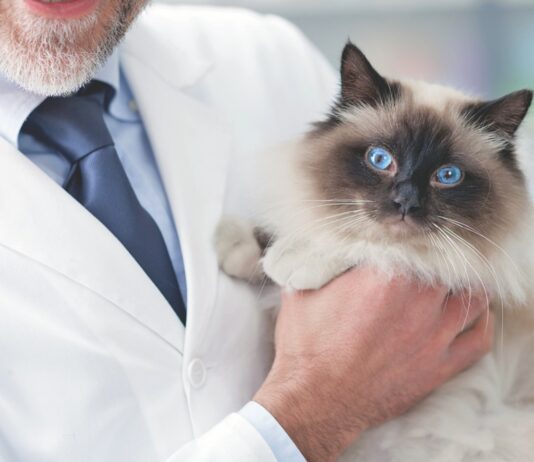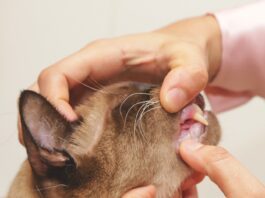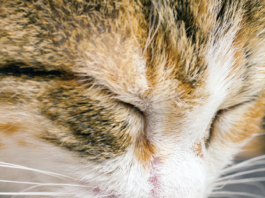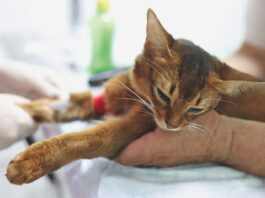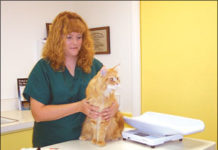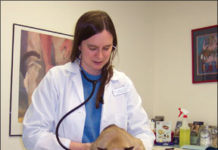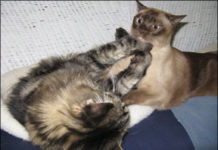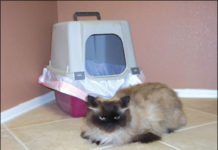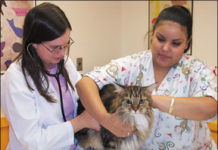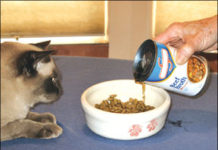Finding Emergency Care
Perhaps the most important characteristic of a responsible cat owner is the ability to distinguish the signs of minor feline illnesses from those calling for an immediate trip to the nearest animal emergency care facility. Cat owners should be equipped ahead of time to deal promptly with such a crisis. They should know precisely where the clinic is located, the speediest route to get there, how to transport the afflicted animal, what documents they should take to the facility - and what to expect to happen upon arrival. Feline emergency cases are by no means rare, says Gretchen Schoeffler, DVM, chief of emergency and critical care services at the Cornell University Hospital for Animals (CUHA). She and her colleagues typically treat as many as 10 or 15 severely ill cats each week in the hospitals emergency unit, which, like most such facilities in the U.S., is open 24 hours a day, seven days a week.
Help Calm Anxiety at the Vet’s Office
Isnt it remarkable that most cats are well-behaved when they visit their veterinarians? First, they are captured and put into an automobile. They remain in their containers, sheltered but helpless, in a room filled with the scent of unfamiliar cats, humans and even dogs. Finally, every bit of security is lost when the cat is removed from its newfound shelter and the veterinary team places the cat on the examination table. Why do cats behave so nicely? Fear can sometimes render a cat motionless and therefore cooperative. Fearful cats - whether immobile or aggressive - can benefit from a behavior modification specifically designed to address high arousal. But what about the average cat, dare I say the "normal" cat? There may be no indication for intensive therapy or anxiety-reducing medication. But clearly, the veterinary experience is not entirely stress-free. Rather than take a cats good behavior for granted, why not reduce some of the stressors that can occur during a visit to the veterinary hospital? Lets examine some components of the visit that could trigger anxiety.
The Rising Cost of Pet Food
Its no secret that gas prices are on the rise. So is just about everything else, including pet food. The U.S. Bureau of Labors Consumer Price Index reports that pet food prices for the second quarter of 2008 rose by eight to nine percent. While thats not as much of an increase as milk or gasoline, consumers are still seeing the most significant price increase in pet food in years. What gives?"If you look at the rising cost of pet foods, its all because of the cost of grains," says Joseph Wakshlag, DVM, PhD, assistant professor of Clinical Nutrition at Cornell Universitys College of Veterinary Medicine. "All of the grains such as corn and rice that are used to make pet food have gone up in price, so pet food prices had to rise as well. And that cost has to be passed on to the consumer." Pet owners like Teri Grohl have noticed. Grohl, an administrative assistant for a high-tech company, spent a portion of her $600 stimulus check on food and cat litter for her three cats, ages 12, six and two.
The Feline Intestinal Tract
Of all feline health problems, intestinal disorders rank among those most frequently treated by veterinarians at local clinics and large referral hospitals throughout the U.S. According to Melanie Craven, BVM, an internist and researcher in gastroenterology at Cornell Universitys College of Veterinary Medicine, vomiting, diarrhea and dramatic weight loss are the most common signs of feline intestinal disease in cats. However, she notes, subtler signs such as lethargy and appetite fluctuations can also suggest the presence of an intestinal disorder. Some of these disorders may be secondary to conditions originating in other organs, such as the thyroid gland, liver, kidneys and pancreas. But, Dr. Craven points out, the problems usually originate in either the upper or lower segments of a cats intestines - the pliable, circuitous tunnel leading from an animals stomach to its anus.
Short Takes: 09/08
While the world holds its breath to see if the highly pathogenic avian flu virus H5N1 mutates enough to spread from person to person, German scientists wondered if the average house cat could have a role. An article in the Journal of Feline Medicine and Surgery (Vol. 10 Issue 4: "Prevalence of influenza H5N1 virus in cats from areas with occurrence of highly pathogenic avian influenza in birds"), gave the results of surveys that covered 171 cats in Austria and Germany. The study was presented "to learn more about the role of cats in the spread of the virus and about the risk posed to cats." They were looking for a good "sentinel" animal among mammals, to give an early warning - the way caged canaries in coal mines used to warn of poisonous gases.
Broken Bones: A Threat to Indoor and Outdoor Cats
Despite their typically strong, agile, and resilient bodies, cats are subject to a wide variety of musculoskeletal disorders - diseases and injuries affecting the complex structure of bones, muscles, tendons and ligaments that give shape to their bodies and enable them to move about. Fortunately, most of these disorders - such as congenital malformations, inflammatory diseases, and tumorous growths - are relatively rare in cats. Less rare by comparison are bone fractures that result from traumatic events, such as when a cat is hit by a car, for example, or falls from a tree. A fracture can occur when any physical force applies sudden and excessive pressure on a bone until it snaps at its weakest point.
Abscesses: Signs of Trouble
For several days, your good old cat has been acting oddly, lolling about the house, uncharacteristically lethargic, off his food and seemingly depressed. Then one evening, while stroking his back to comfort the mysteriously dispirited animal, you notice a smallish but alarming lump just to the side of his tail. Although you touch the lump ever so gently, he reacts with a howl, hisses, leaps from your lap and scurries to a dark corner. The lump you discovered is quite possibly an abscess, and although your touching it caused the poor animal intolerable discomfort, its a good thing that you spotted it. The sensitive swelling may indicate that the cat has an infection of some sort, which would explain his sluggish behavior of late, and prompt veterinary care is in order.
Ask Elizabeth: 08/08
Hmm, if I had known about this disease during my days on the farm, I might not have been so keen on eating birds myself! Songbird fever is an uncommon disease of cats, that results from eating Salmonella-infected birds or from spending time in bird feeding areas (and ingesting contaminated bird feces). Symptoms of songbird fever appear suddenly two to four days after exposure, last two to seven days, and include high fever, anorexia, depression, diarrhea (which may contain blood) and vomiting. The diagnosis can be confirmed by bacterial culture of the feces or blood. Songbird fever is fatal in up to 10 percent of cases.
Caring for the Constipated Cat
Your cat has always been a creature of habit when it comes to moving his bowels. Twice a day - once in the morning and once in the evening - he shuffles to his litter box and gracefully relieves himself. If Plato should ever break that pattern and not move his bowels for a day or two, youd be wise to have him examined by your veterinarian right away. Its possible that he is constipated, a condition that will probably be easily relieved if spotted early. Without diagnosis and proper treatment, however, his constipation could progress rapidly to a serious threat to his health, perhaps his life.
Understand Skin Disorders
The function of your cats skin extends well beyond its role as the matrix for the animals lustrous haircoat. In a healthy feline, the skin also works, for example, as a barrier against invasion by harmful microorganisms. It serves as a watertight seal, retaining an animals body fluids and preventing dehydration. And it insulates an animals internal organs against the outside worlds extremes of heat and cold. Despite its normally durable structure, however, every cats skin is subject to a wide array of disorders, most of which are minor and readily treatable. But some untreated skin conditions can rapidly progress to a serious, even lethal, stage, with systemic implications. Considering the dangerous potential of virtually any untreated skin condition, William H. Miller Jr., VMD, a professor of dermatology at Cornell Universitys College of Veterinary Medicine, strongly urges cat owners to practice what he terms "preventive maintenance." Keep an eye out, he advises, for any suspicious scratching or hair loss that might suggest the presence of a parasitic, bacterial or fungal infection. Take note of any skin wounds, growths or swollen areas on the skin, no matter how inconsequential they may seem. And seek the counsel of a veterinary dermatologist if any such suspicious signs appear.
Feeding the Stressed Cat
Fires in California last fall caused more than 300,000 residents and their pets to flee their homes. This spring, an estimated 1,000 dogs and cats in Iowa, Indiana and Missouri were temporarily relocated or found stranded as a result of recent flooding in these areas. And dont forget Hurricane Katrina, which displaced an estimated 50,000 animals in 2005. A house pet that suddenly finds itself in a noisy, unfamiliar shelter, or worse yet, barely clinging to life from the peak of a rooftop, suffers from a high level of stress. Though your feline hopefully will never experience this level of stress, the physical responses to stress - whatever the cause - are similar. So, whether the cause of a cats stress is a catastrophic disaster or the addition of a new kitten into the home, much can be learned from those who routinely work with stressed felines and applied to our house cats - particularly when it comes to feeding and nutrition.
Short Takes: 08/08
With 28.7 percent of all adult American cats classified as "overweight" and 6.4 percent as clinically obese, things only get worse with age. Among cats between five and 11 years of age, fully 44 percent are either overweight or obese. Just in time (we were about to have Frannie, the ShortTakes office kitty, fitted for running shoes) comes this report in the Journal of the American Veterinary Medical Association (Vol. 232, No. 11): "Nutraceuticals and dietary supplementation for the management of obese and overweight pets." The study looked at everything from omega-3 fatty acid supplementation, amylase inhibitors and DHEA (dehydroepiandrosterone) to L-carnitine, CLA (conjugated linoleic acid) and dietary phytoestrogens. Some, such as diacylglycerol, make a computers spell-checker burp. And not all, including the last one, have been tested on cats.

